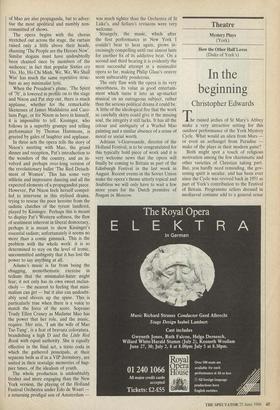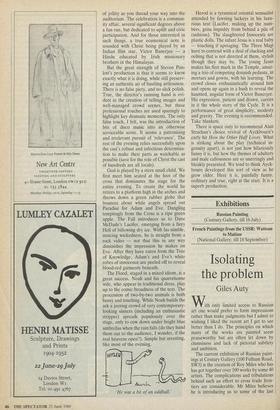Theatre
Mystery Plays (York) How the Other Half Loves (Duke of York's)
In the beginning
Christopher Edwards
The ruined arches of St Mary's Abbey make a very attractive setting for this outdoor performance of the York Mystery Cycle. What would an alien from Mars or even an archangel from Paradise — make of the plays in their modern guise?
Both might spot a touch of religious motivation among the few charismatic and other varieties of Christian taking part. But, you hardly need reminding, the gov- erning spirit is secular, and has been ever since the Cycle was revived back in 1951 as part of York's contribution to the Festival of Britain. Programme sellers dressed in mediaeval costume add to a general sense of jollity as you thread your way into the auditorium. The celebration is a commun- ity affair, several significant degrees above a fun run, but dedicated to uplift and civic participation. And for those interested in such things, a true ecumenical note is sounded with Christ being played by an Indian film star, Victor Banerjee — a Hindu educated by Irish missionary brothers in the Himalayas.
But the great strength of Steven Pim- lott's production is that it seems to know exactly what it is doing, while still preserv- ing an authentic air of bustling artlessness. There is no false piety, and no slick polish. True, the director's cunning hand is evi- dent in the creation of telling images and well-managed crowd scenes, but these professional touches are used sparingly to highlight key dramatic moments. The only false touch, I felt, was the introduction of bits of disco music into an otherwise serviceable score. It seems a patronising and irrelevant pursuit of 'relevance'. The rest of the evening relies successfully upon the cast's robust and infectious determina- tion to make their parts as watchable as possible (save for the role of Christ the cast of hundreds are all locals).
God is played by a stern small child. We first meet him seated at the foot of the cross that dominates the stage for the entire evening. To create the world he retires to a platform high in the arches and throws down a green rubber globe that bounces about while angels spread out Paradise for Adam and Eve. Dangling temptingly from the Cross is a ripe green apple. The Fall introduces us to Dave McDade's Lucifer, emerging from a fiery Hell of billowing dry ice. With his nimble, mincing wickedness, he is straight from a rock video — not that this in any way diminishes the impression he makes on Eve. After they have eaten from the Tree of Knowledge, Adam's and Eve's white robes of innocence are peeled off to reveal blood-red garments beneath.
The Flood, staged in a mixed idiom, is a great success. Noah and his quarrelsome wife, who appear in traditional dress, play up to the comic broadness of the text. The procession of two-by-two animals is both funny and touching. While Noah builds the ark a jeering crowd of very contemporary- looking sinners (including an enthusiastic stripper) spreads populously over the stage, only to cow down under bright blue umbrellas when the rain falls (do they hand them out to the audience, I wonder, if the real heavens open?). Simple but arresting, like most of the evening. Herod is a tyrannical oriental sensualist attended by fawning lackeys in his luxu- rious tent (Lucifer, making up the num- bers, grins impishly from behind a pile of cushions). The slaughtered Innocents are plastic dolls. The infant Jesus is a real baby — touching if upstaging. The Three Magi have to contend with a deal of clucking and oohing that is not directed at them, stylish though they may be. The young Jesus makes his first mark in the Temple, amaz- ing a trio of competing donnish pedants, in mortars and gowns, with his learning. The crowd closes enthusiastically around him and opens up again in a hush to reveal the haunted, angular form of Victor Banerjee. His expression, patient and drawn, carries in it the whole story of the Cycle. It is a performance of great simplicity, modesty and gravity. The evening is recommended. Take blankets.
There is space only to recommend Alan Strachan's choice revival of Ayckbourn's early hit How the Other Half Loves. What is striking about the play (technical in- genuity apart), is not just how hilariously funny it is, but how the themes of adultery and male callousness are so unerringly and bleakly presented. We tend to think Ayck- bourn developed this sort of view as he grew older. Here it is, painfully funny, ordinary and true, right at the start. It is a superb production.











































































 Previous page
Previous page